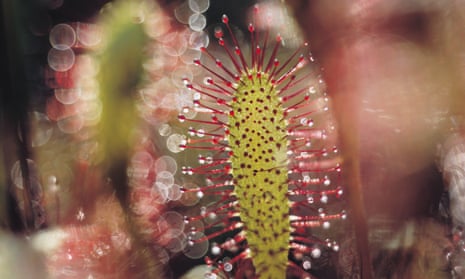Meat-eating plants have got a savage reputation to live up to, but some of them grow largely unnoticed in boglands across Britain. One of our most magnificent carnivorous plants is the great sundew, Drosera anglica. Its glistening red tentacles spray out like sticky fingers on a hand and small creatures passing by get caught on the drops of glue. After which the tentacles and leaf slowly curl around the prey in a deadly embrace before digesting the victim.
The sundew grows in boggy land where the soil is poor and the plant gets a big boost in nutrition with a diet of bugs. And yet this sundew is much more than just a botanical oddball. It used to be widespread across the lowland bogs of England but over the years it’s faced an onslaught of peat digging, land drainage and fertilisers running off farms, all of which have left this astonishing plant endangered in England.
Marshes and bogs are not exactly our most glamorous landscapes, which probably explains why they tend to be ignored and undervalued. Yet this winter’s devastating floods showed how bogs can protect against torrential downpours by soaking up rainfall like sponges, then gradually releasing the rainwater without harm. In fact, bogs are some of our best flood defences – without them we are dangerously exposed to increasingly violent rainstorms.
And there’s another huge role played by bogs. They protect against climate change by locking away carbon dioxide from the air in vast reserves of carbon buried in the peat. Bogs may be unglamorous but they are a precious natural resource. We tamper with them at our peril.

Comments (…)
Sign in or create your Guardian account to join the discussion